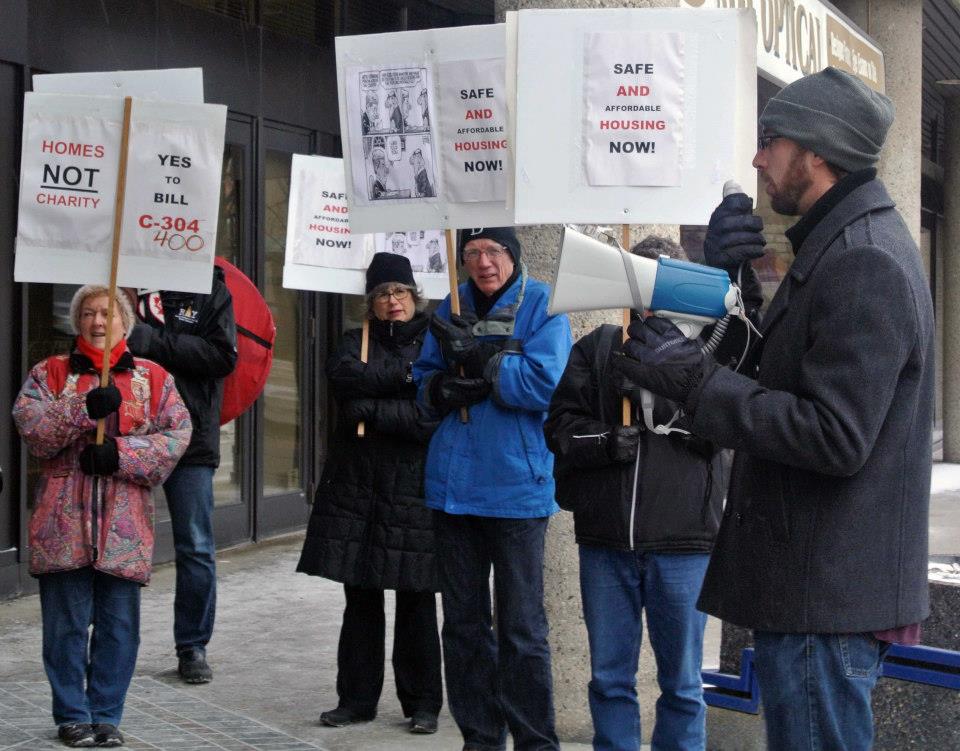A vote on Bill C-400, for a National Housing Strategy, is expected tonight in the House of Commons. The following open letter was issued by a number of organizations.
Canada is the only G8 country without a coordinated national strategy for homelessness and housing. While we are aware that all levels of government have made increased investments in social and affordable housing, there has yet to be sufficient coordination and resources allocated to adequately address the reality that over 1 million people in Canada experience difficulty retaining their housing.
In just a few days, Members of Parliament have an opportunity to bring Canada on par with other G8 countries by voting in favour of Bill C-400, an act to ensure secure, adequate, accessible and affordable housing for Canadians. As organizations working with women and seeking to promote women’s human rights we wish to bring to your attention the very serious implications of housing insecurity on women, and urge you as Members of Parliament to support this bill as a means to promote and protect their safety, and health while fulfilling international human rights obligations.
Lack of access to safe and affordable housing continues to be a serious concern for many women in Canada. Poverty, intimate partner violence, and lone parenting are all more common among women, making housing insecurity and the risk of homelessness a pressing gender issue. The women that are most affected by housing issues face multiple forms of discrimination and are often Aboriginal, racialized, immigrants or refugees, living with a disability, seniors or youth. For example, women and children, particularly women of colour and Aboriginal women, are the fastest growing groups using shelters in the country.
For women, the risks of housing insecurity and homelessness are also higher. Women that are street involved or are among the hidden homeless (i.e. couch surfing), are extremely vulnerable to sexual assault and other forms of violence. Many women stay in violent and dangerous living situations to avoid becoming homeless. Still, the prevalence of women and children escaping violence is disconcerting. According to the latest statistics available, of the 6,109 women and children residing in shelters across Canada on one day, about 5,000 had escaped an abusive situation. Many more women are turned away from shelters because of lack of space.
The health problems that women experience as a result of housing insecurity are also severe. Many suffer from mental health problems and substance abuse disorders stemming from their precarious housing situations, poverty and histories of abuse. Inadequate housing also puts women at higher risk for chronic, infectious and sexual transmitted diseases including HIV/AIDS, and often results in premature death. Compared to men in the same housing conditions, women are three times more likely to commit suicide, and six times that of women with adequate housing.
The United Nations Committee on the Elimination of Discrimination against Women (CEDAW) has even taken note of the homelessness and housing insecurity afflicting many women in Canada, and has called for a national strategy to deal with the problem. As organizations working with women and seeking to promote their human rights, we wish to echo the Committee’s recommendations. We know that adequate incomes from employment and income assistance programs, and appropriate, accessible supports such as childcare and harm reduction initiatives are also necessary to end women’s and families’ homelessness, but a strategy to ensure secure, adequate, accessible and affordable housing that includes targets, timelines and accountability mechanisms, will go a long way to addressing the problem.
We, the undersigned, therefore call on all Members of Parliament to take further action to promote the safety and health of women by supporting the creation of a National Housing Strategy through Bill C-400.
Canadian Association of Elizabeth Fry Societies (CAEFS)
Canadian Federation of University Women (CFUW)
City for All Women Initiative (CAWI)
CEP (Communications, Energy and Paperworkers Union of Canada)
Community Society to End Poverty-Nova Scotia (CSEP-NS)
CUPE (Canadian Union of Public Employees)
CUPW (Canadian Union of Postal Workers)
Feminist Legal Studies Queen’s
Harmony House
Lanark County Interval House (LCIH)
Ontario Coalition of Interval and Transition Houses (OAITH)
Metropolitan Action Committee on Violence Against Women and Children (METRAC)
National Council of Women Canada (NCWC)
Native Women’s Association of Canada (NWAC)
Public Service Alliance of Canada (PSAC)
Regroupement des maisons pour femmes victimes de violence conjugale
Toronto Women’s City Alliance
Transition House Association of Newfoundland and Labrador
Transition House Association of Nova Scotia
Tri County Women’s Centre – Yarmouth Nova Scotia
West Coast Women’s Legal Education & Action Fund
Women’s Action Alliance for Change Nova Scotia (WACNS)
Women’s Economic Council (WEC)
YWCA Canada



